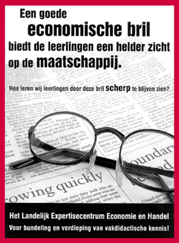Economics Goes to Hollywood
Auteur(s)
Don, Leet; Houser, Scott
Titel
Economics Goes to Hollywood: Using Classic Films and Documentaries to Create an Undergraduate Economics
Type bron
Wetenschappelijk artikel
Tijdschrift
The Journal of Economic Education
Jaar van Publicatie
2003
Jaargang (Volume)
34
Nummer (Issue)
4
Paginanummer
326-332
Trefwoorden
Concept-context, film
AE of BE
Algemene economie
Uitgever
Taylor & Francis, Ltd.
ISSN/ISBN
00220485
Abstract
De auteurs beschrijven een interdisciplinaire aanpak voor het onderwijzen van economie in een “undergraduate course” (leerlingen qua leeftijd rond de 18, die voor een economiestudie hebben gekozen). Ze maken gebruik van een krachtig en modern medium, de speelfilm, om een context te bieden waar vanuit basale economische concepten kunnen worden aangeleerd. De plotten van films kunnen worden gebruikt om problemen en kwesties te illustreren die zich lenen voor economische analyse. De collegereeks bestaat uit 5 componenten: leesmateriaal, colleges, discussie, werkstukken en de films. De auteurs laten zien hoe een serie van films kan worden gebruikt voor een collegereeks voor beginnende economiestudenten.
Het artikel bevat een lijst met geschikte films en de economische concepten die aan die films te koppelen zijn.
Voorbeelden hiervan zijn:
Wall Street (1987) Gemengde economie, financiële markten Boiler Room (2000) Overheidsregulatie, a-symmetrische informatie Salt of the Earth (1954) Vakbonden, discriminatie Erin Brockovitch (2000) Marktfalen, externe effecten The Grapes of Wrath (1940) Business cycles, recessie, collectieve vraag, fiscaal beleid. Modern Times (1936) specialisatie, productiviteit
Link naar publicatie
Website van het tijdschrift: http://www.tandf.co.uk/journals/titles/00220485.asp

- Vakdidactisch onderzoek
-
Bronnenbank
-
A Little More than Chalk and Talk
-
A Student Learning Inventory for Economics
-
Appealing to Good Students in Introductory Economics
-
Comparing Student Achievement
-
De concept-context-benadering. Tien vragen aan Lenie Kneppers
-
Do Classroom Experiments Increase Learning in Introductory Microeconomics?
-
Economics as Detective Fiction
-
Economics Goes to Hollywood
-
Introducing Undergraduates to Economics in an Interdisciplinary Setting
-
Measuring teacher efficacy for use in economic education
-
Notetaking, Working Memory, and Learning in Principles of Economics
-
Problem-Based Learning
-
Problem-Based Learning and High School Macroeconomics
-
Teaching Economics in 21st Century
-
Teaching Mixed Strategy Nash Equilibrium to Undergraduates
-
Testing for Depth of Understanding in Economics Using Essay Questions
-
Use It or Lose It
-
Using Context in Classroom Experiments
-
Using Just-in-Time Teaching Techniques in the Principles of Economics Course
-
Using Technology to Facilitate Active Learning in Economics Through Experiments
-
Using Writing Across the Curriculum in Economics
-
Voluntary Economics Content Standards for America’s Schools
-
A Little More than Chalk and Talk
